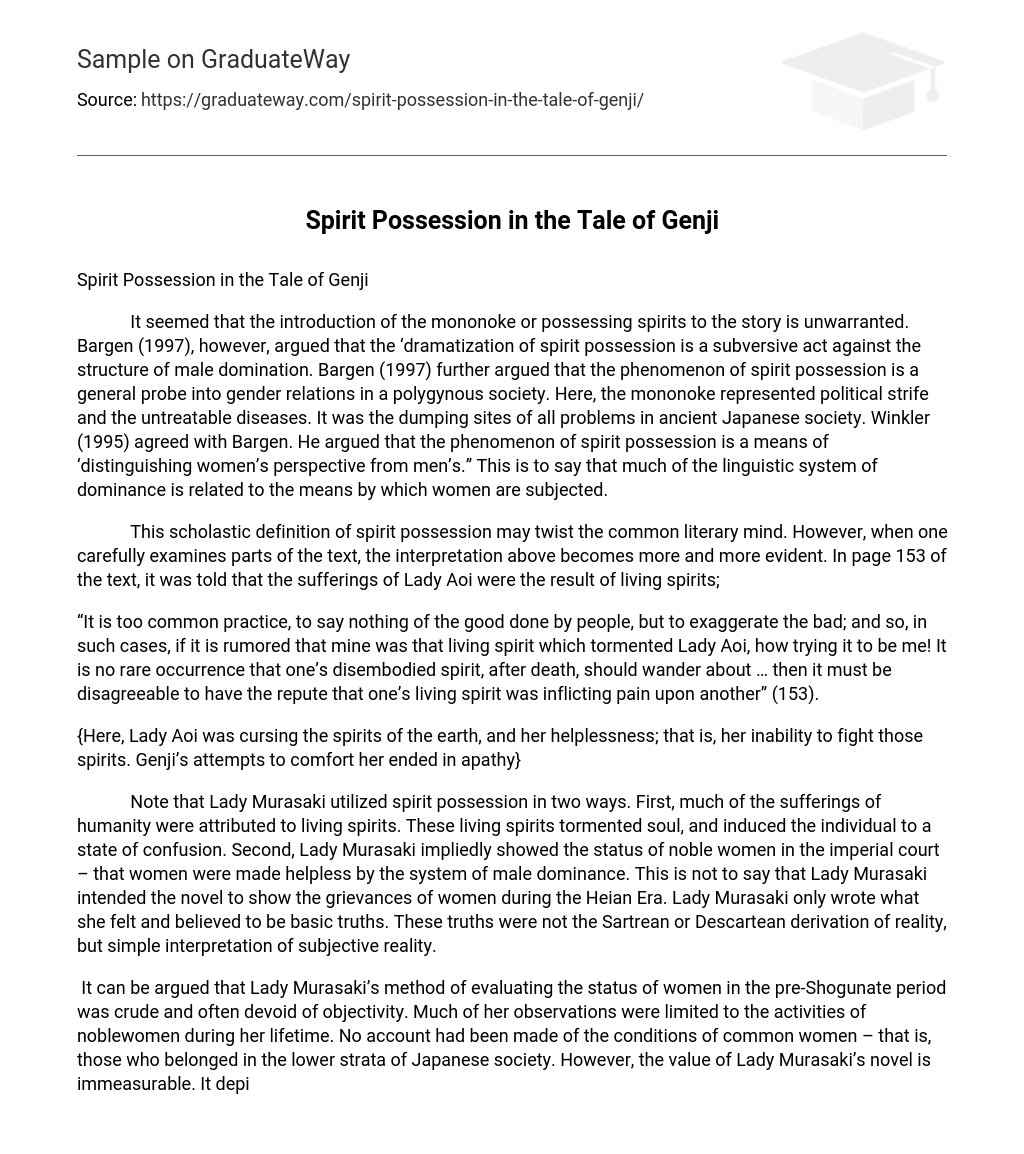It seemed that the introduction of the mononoke or possessing spirits to the story is unwarranted. Bargen (1997), however, argued that the ‘dramatization of spirit possession is a subversive act against the structure of male domination. Bargen (1997) further argued that the phenomenon of spirit possession is a general probe into gender relations in a polygynous society. Here, the mononoke represented political strife and the untreatable diseases. It was the dumping sites of all problems in ancient Japanese society. Winkler (1995) agreed with Bargen. He argued that the phenomenon of spirit possession is a means of ‘distinguishing women’s perspective from men’s.” This is to say that much of the linguistic system of dominance is related to the means by which women are subjected.
This scholastic definition of spirit possession may twist the common literary mind. However, when one carefully examines parts of the text, the interpretation above becomes more and more evident. In page 153 of the text, it was told that the sufferings of Lady Aoi were the result of living spirits;
“It is too common practice, to say nothing of the good done by people, but to exaggerate the bad; and so, in such cases, if it is rumored that mine was that living spirit which tormented Lady Aoi, how trying it to be me! It is no rare occurrence that one’s disembodied spirit, after death, should wander about … then it must be disagreeable to have the repute that one’s living spirit was inflicting pain upon another” (153).
{Here, Lady Aoi was cursing the spirits of the earth, and her helplessness; that is, her inability to fight those spirits. Genji’s attempts to comfort her ended in apathy}
Note that Lady Murasaki utilized spirit possession in two ways. First, much of the sufferings of humanity were attributed to living spirits. These living spirits tormented soul, and induced the individual to a state of confusion. Second, Lady Murasaki impliedly showed the status of noble women in the imperial court – that women were made helpless by the system of male dominance. This is not to say that Lady Murasaki intended the novel to show the grievances of women during the Heian Era. Lady Murasaki only wrote what she felt and believed to be basic truths. These truths were not the Sartrean or Descartean derivation of reality, but simple interpretation of subjective reality.
It can be argued that Lady Murasaki’s method of evaluating the status of women in the pre-Shogunate period was crude and often devoid of objectivity. Much of her observations were limited to the activities of noblewomen during her lifetime. No account had been made of the conditions of common women – that is, those who belonged in the lower strata of Japanese society. However, the value of Lady Murasaki’s novel is immeasurable. It depicted the dependence of women to men – a reflection of male dominance.
The introduction of mononoke in the story never altered the overall condition of the story. Note that the mononoke was sometimes used as an element for representing jealousy and evasiveness of the human heart (as in the case in page 176 and 177). On page 53, the mononoke was an actual entity that disrupts the human soul. On page 61, the mononoke seemed to represent the overall suffering of the human body (physical). In any case, the use of mononoke could not possibly alter the overall condition of the story because of its commonality and ‘versatility’ in usage. {One should attempt to extract the multiple meanings of the mononoke in the novel}
References
Bargen, Doris. 1997. A Woman’s Weapon: Spirit Possession in the Tale of Genji. University of Hawaii Press.
The Tale of Genji. 2000 ed. New York: Macmillan Publishing Company.
Winkler, John. 1995. The Spirit Dialogues. Seminal Paper on the Japanese Literature No. 23.





